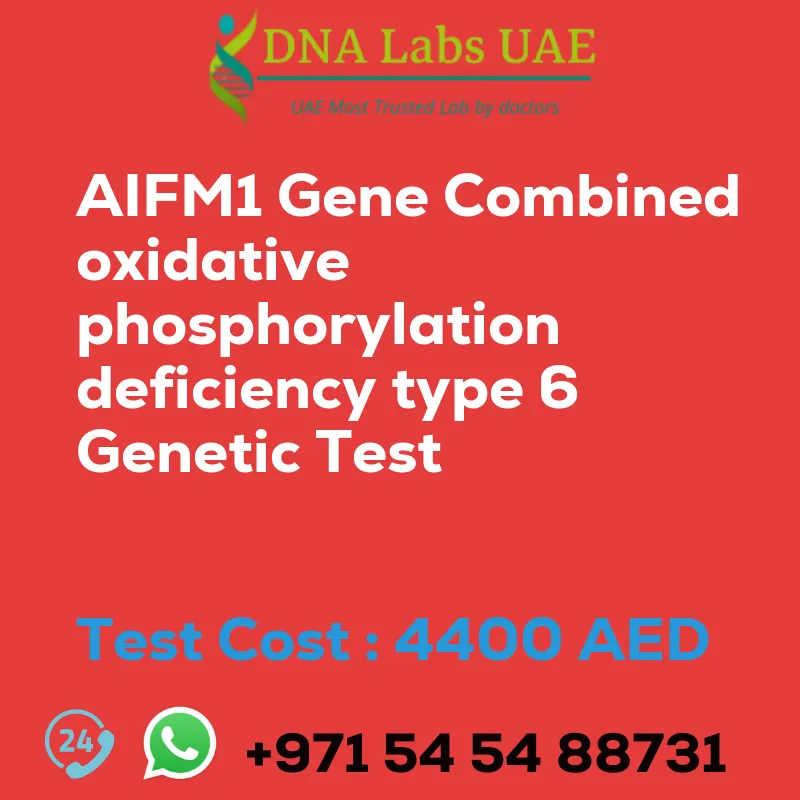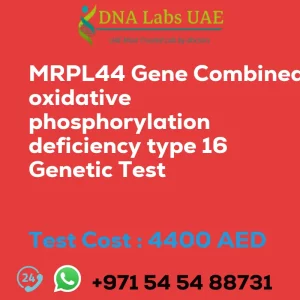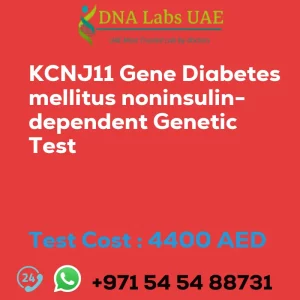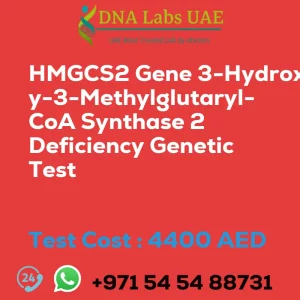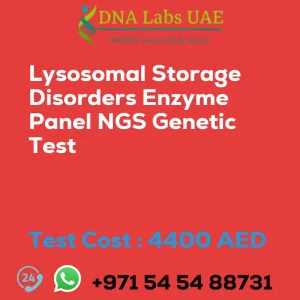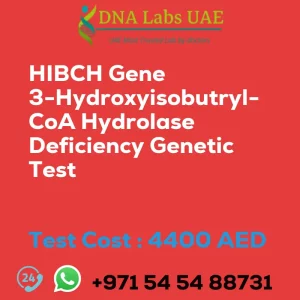AIFM1 Gene Combined Oxidative Phosphorylation Deficiency Type 6 Genetic Test
Components
- Test Name: AIFM1 Gene Combined Oxidative Phosphorylation Deficiency Type 6 Genetic Test
- Price: 4400.0 AED
- Sample Condition: Blood
- Report Delivery: 3 to 4 Weeks
- Method: NGS Technology
- Test Type: Metabolic Disorders
- Doctor: General Physician
- Test Department: Genetics
Pre Test Information
Clinical History of Patient who is going for AIFM1 Gene Combined Oxidative Phosphorylation Deficiency Type 6 NGS Genetic DNA Test. A Genetic Counselling session to draw a pedigree chart of family members affected with Combined Oxidative Phosphorylation Deficiency Type 6.
Test Details
The AIFM1 gene is associated with a condition called Combined Oxidative Phosphorylation Deficiency Type 6 (COXPD6). This condition is characterized by a deficiency in the energy-producing process called oxidative phosphorylation, which leads to a variety of symptoms including muscle weakness, developmental delay, and neurological problems.
NGS (Next-Generation Sequencing) genetic testing is a method used to analyze the DNA sequence of genes. In the case of COXPD6, NGS genetic testing can be used to identify mutations or variations in the AIFM1 gene that may be responsible for the condition. NGS genetic testing involves obtaining a DNA sample from the individual, typically through a blood sample or saliva sample. The DNA is then sequenced using advanced sequencing technologies to identify any changes in the AIFM1 gene sequence.
By identifying specific mutations or variations in the AIFM1 gene, NGS genetic testing can help confirm a diagnosis of COXPD6 and provide important information for treatment and management of the condition. It can also be used for carrier testing, prenatal testing, and family planning purposes.
It’s important to note that NGS genetic testing may not be available in all healthcare settings and may require a referral to a specialized genetics clinic or laboratory. Additionally, the interpretation of NGS test results should be done by a qualified healthcare professional or genetic counselor who can provide appropriate counseling and guidance based on the individual’s specific situation.
| Test Name | AIFM1 Gene Combined oxidative phosphorylation deficiency type 6 Genetic Test |
|---|---|
| Components | |
| Price | 4400.0 AED |
| Sample Condition | Blood |
| Report Delivery | 3 to 4 Weeks |
| Method | NGS Technology |
| Test type | Metabolic Disorders |
| Doctor | General Physician |
| Test Department: | Genetics |
| Pre Test Information | Clinical History of Patient who is going for AIFM1 Gene Combined oxidative phosphorylation deficiency type 6 NGS Genetic DNA Test A Genetic Counselling session to draw a pedigree chart of family members affected with Combined oxidative phosphorylation deficiency type 6 |
| Test Details |
The AIFM1 gene is associated with a condition called Combined Oxidative Phosphorylation Deficiency Type 6 (COXPD6). This condition is characterized by a deficiency in the energy-producing process called oxidative phosphorylation, which leads to a variety of symptoms including muscle weakness, developmental delay, and neurological problems. NGS (Next-Generation Sequencing) genetic testing is a method used to analyze the DNA sequence of genes. In the case of COXPD6, NGS genetic testing can be used to identify mutations or variations in the AIFM1 gene that may be responsible for the condition. NGS genetic testing involves obtaining a DNA sample from the individual, typically through a blood sample or saliva sample. The DNA is then sequenced using advanced sequencing technologies to identify any changes in the AIFM1 gene sequence. By identifying specific mutations or variations in the AIFM1 gene, NGS genetic testing can help confirm a diagnosis of COXPD6 and provide important information for treatment and management of the condition. It can also be used for carrier testing, prenatal testing, and family planning purposes. It’s important to note that NGS genetic testing may not be available in all healthcare settings and may require a referral to a specialized genetics clinic or laboratory. Additionally, the interpretation of NGS test results should be done by a qualified healthcare professional or genetic counselor who can provide appropriate counseling and guidance based on the individual’s specific situation. |

